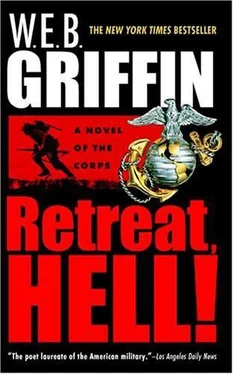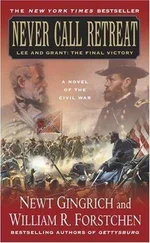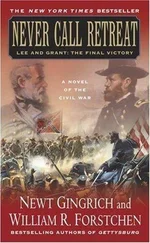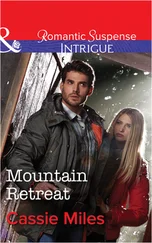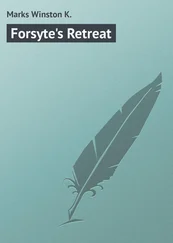"To judge by your spiffy appearance, I guess you heard who's due at Kimpo at 0900?" he said.
"I got a message from Hart, sir, to be at Kimpo at 0900," McCoy said. "No names were mentioned."
"El Supremo is going to turn Liberated Seoul back over to Syngman Rhee at about eleven," Howe said. "Maybe it'll really be liberated by then. Some of the North Koreans apparently didn't get the word."
McCoy chuckled.
"And Charley said that if anyone could get us a bath, a shave, and clean uniforms, it would be you two," Howe said.
"And maybe something besides powdered eggs for breakfast?" Master Sergeant Charley Rogers said.
He, too, was a National Guardsman. He had been Captain Howe's first sergeant and had been with him ever since. That meant when President Harry S Truman had ordered—actually asked, "Ralph, I need you"—General Howe to active duty, the first thing General Howe had done was ask just about the same question of Charley Rogers.
Zimmerman got up and went through the door to the kitchen.
"Are you going to have good news for your boss, Ken?" General Howe asked. "I am presuming he will be with the imperial entourage."
"I sent General Pickering a message last night, sir. Pick . . . Major Pickering ... is out there somewhere, within a fifty-mile radius of Suwon. I don't think we missed him by more than a couple of hours, and I don't have any reason to believe he's in trouble."
"He's in trouble—we're all in trouble—until we get him back, Ken."
"Yes, sir."
"What's the problem, Ken? And how do we get around it?"
"The scenario is this, sir. Whenever they can, Colonel Dunn's pilots look for the messages he leaves, ones he stamps out in rice paddy mud. Sometimes they eyeball them, sometimes the photo interpreters pick them out from aerial photographs. So we've had a rough idea where he is ever since he was shot down. Locating him precisely is part of the problem. And then, even if we do that, picking him up will then be the problem. The ideal way to do that is with a helicopter. The problem there—"
"—is that there aren't very many helicopters," General Howe picked up. "And those that exist are being used to haul wounded—"
"—or brass," McCoy began, and corrected himself: "— senior officers — where they have to go. And General Pickering doesn't want to take a chopper away from hauling the wounded to look for Pick or pick him up."
Zimmerman came back into the dining room, followed by the Korean housekeeper, who carried a tray with a silver coffee service on it.
"You were right, Charley," General Howe said. "While we're drinking three-day-old coffee from canteen cups, these two—"
"I told her to make ham and eggs, sir," Zimmerman said. "Will that be all right?"
If that's the best you can do, Mr. Zimmerman, I guess it will have to do," Master Sergeant Rogers said.
Howe chuckled, then said: "We can't afford to have Major Pickering captured, Ken. We may have to borrow a helicopter for a while, General Pickering's feelings aside."
It was an observation more in the nature of a decision, and thus an order. While legally Major General Howe had no authority to order anyone to do anything, he was in Korea bearing orders signed by Harry S Truman, as President and Commander-in-Chief, which ordered that "all U.S. military and governmental agencies provide General Howe with whatever assistance of whatever kind he deems necessary for the accomplishment of his mission."
Howe, who had been a captain with Captain Harry S Truman in France in World War I, and who had risen to Major General in World War II, was in Korea as Truman's eyes.
No one from MacArthur down was going to refuse him anything he asked for.
McCoy didn't reply.
The door opened again, and "Major" William R. Dunston walked in.
"I just heard you were here, sir—" he began.
"Mooching breakfast," Howe interrupted him. "And, I hope, a shower, shave, and some clean fatigues."
"Not a problem, sir," Dunston said.
"If you didn't know that General MacArthur's due at Kimpo sometime around nine, Bill, I'd be very surprised."
"I heard, sir," Dunston said. "Good morning, Charley."
Master Sergeant Rogers nodded and smiled.
"Did your guy get anything out of my guy, Bill?" McCoy asked.
"I was going to ask you to sit in on that," Dunston said. "You and Ernie. They're still in the basement."
"I'm in the dark," General Howe said simply.
"We took some prisoners yesterday, sir, " McCoy began. "We were on our way here, and they just came barreling up the highway. The senior one's a lieutenant colonel. Arrogant sonofabitch. I've got a gut feeling he's somebody important. Ernie and I couldn't get anything out of him. The other four I turned over to 7th Division."
Howe nodded.
"I thought he might react to a senior officer, and Bill has had an ROK colonel interrogating him," McCoy went on.
"I can't believe anyone could get more out of a prisoner than you two can," Howe said.
"I don't think he knows anything about troop dispositions, that sort of thing," McCoy replied. "And if he does, he won't tell us. But I thought he might let something slip when trying to impress a senior officer with his own importance."
"And has he, Bill?" Howe asked.
Dunston looked uncomfortable.
"What does your man say he got from this fellow, Bill?" Howe persisted.
"I'm afraid Colonel Lee thinks he got more out of the prisoner than is the case, General," Dunston said.
"What?" Howe asked. There was now a hint of impatience in his voice.
"Something I would much rather not pass on, especially to someone as senior as you, until I had a hell of a lot to back it up," Dunston said.
"Specifically, what?" Howe demanded.
"Colonel Lee thinks this guy has information that the Chinese are coming in," Dunston said. "He didn't say that, in so many words. It's more of a gut feeling on Lee's part.
"Interesting," Master Sergeant Rogers said.
"General," Dunston said, "the first thing I was going to do—did—was ask Major McCoy and Mr. Zimmerman to talk first with Colonel Lee, and then the prisoner, and see what they think. And even—no offense—if they thought there was something to it, think long and hard before passing it on."
Howe grunted.
"Afraid of calling, 'Wolf, wolf?" he asked.
"Yes, sir," Dunston said, and added, "General, you've got me on a spot, sir—"
He was interrupted in midsentence by the Korean housekeeper, who entered the room with Howe's and Rogers's breakfasts.
No one spoke until she had laid the plates before them, poured coffee, and left the room.
"I understand, Bill," Howe resumed.
"General, I think the Chinese will come in," Dunston said. "But I don't want to be—you said it, sir—crying wolf until I have a lot more than this to back it up."
"I understand," Howe repeated, and started to say something else when the door from the foyer opened and another man came in.
This one was wearing a USMC flight suit, to the breast of which was fixed a leather patch bearing stamped-in-gold-leaf Naval aviator's wings, and the legend W.C. Dunn, LtCol USMC.
Lieutenant Colonel William C. Dunn, who was five feet six inches tall and weighed not quite one hundred forty pounds, was visibly surprised and discomfited when he saw the two silver stars of each collar point of General Howe's soiled and rumpled Army fatigues.
"I beg the general's pardon, sir," he said, coming almost to attention. "I didn't know the general was in here."
"Colonel Dunn, right?" Howe asked.
"Yes, sir."
"Your reputation precedes you, Colonel," General Howe said. "Please sit down. Have you had your breakfast?"
General Howe thought: With that pink skin and blond crew cut, he really does look like "an overage cheerleader, " which is how Ernie Zimmerman described him.
Читать дальше
